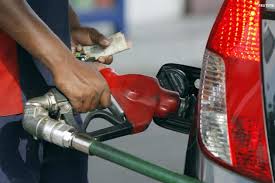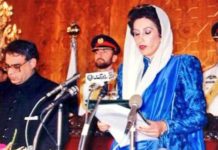Monitoring Desk
A commission of inquiry formed in July this year to probe into a sudden shortage of petrol in the country has found out that one of the reasons behind the crisis was a lack of coordination among the departments working under the Petroleum Division.
The report submitted to Prime Minister Imran Khan, said oil marketing companies (OMCs) were primarily responsible for the shortage of the fuel that hit the country in early June as they deliberately stopped supplying petroleum products to pumps despite having considerable stocks at their disposal.
It said the OMCs made from Rs6 to Rs8 billion during the June oil crisis by committing every illegality in “business as usual” manner. It said the crisis period between June 1 to June 26 needed to be discussed specifically to see how the OMCs fared during this time.
“The prices of MS [petrol] were substantially cut on May 31 and the new price was set at Rs74.52 per liter [in view of lowering oil prices in the international market].
It said as the OMCs would incur a substantial Inventory loss by free sale in June, they took the easy way out to simply slow down or dry out supplies, against all legal and moral norms.
“Consequently, the shortage of MS began to surface across Pakistan and the filling stations gradually became dry, denying the public at large to reap the benefit of this substantial price cut.”
It said the OMCs, in contravention of license conditions, slowed down the supply of petrol to their filling stations. On a lesser scale, the filling stations also held back on whatever stock they had in their tanks.
“All OMCs [other than the Pakistan State Oil (PSO) and Shell] proportionally held on to their stocks with knowledge of anticipated rise in prices. This has been proven during ground check of filling stations and records submitted by the OMCs with affidavits,” the report said.
During this period of crisis, it said, the OMCs showed sales on paper but the ground check of filling stations across Punjab clearly revealed that the OMCs were well short on supply.
“It is clear that all OMCs had a fairly good idea of a price increase of at least Rs20/liter and thus illegally hoarded their stocks during the crisis, stripping the public at large of billions of rupees.”
It said the PSO being a state-owned entity could not follow this illegal suit due to the prevailing situation. Consequently, its market share in the period of shortage increased by nearly 20% and consequently, it sustained a loss of Rs7-8 billion in the process.
“Likewise, Shell, to some extent, also tried to keep pace with the situation and fared much better than other OMCs. Shell also posted a loss of more than Rs8 billion in the first two quarter of 2020.”
The report said the Ministry of Petroleum and the director general (DG) oil also failed to ensure uninterrupted supply of the fuel while the governmental institutions working under the Petroleum Division also failed to check the stock of oil marketing companies.
“During the period of crisis, the Oil and Gas Regulatory Authority (Ogra) being the regulatory body remained as apathetic to the situation as a non-functional entity could be.
“Ogra did issue show cause notices to 9 OMCs and fined them a total of Rs50 million. However, the show-cause notices were devoid of any authentic/quantified detail and seemed more of a ritual used as a defensive ploy on part of Ogra.
“Further, the 9 companies very conveniently paid a paltry sum of Rs25 million – 45 % of the total fine imposed – and went into review against the penalty,” it said.
The report noted that Dr Shafi-ur-Rehman Afridi, a veterinary physician by training, was appointed as the DG Oil. It noted that Dr Afridi had no previous experience of working in the oil sector.
“The posting of the incumbent as well as previous DGs Oil has also been found against the approved criteria/rules. The current DG-Oil Dr Shafi-ur-Rehman Afridi is a grade-20 officer of the Office Management Group (OMG) and with no previous experience related to the post of DG Oil.
“This fact reflects gross violation on the part of MoEPD and its non-seriousness to attend to the issues and functioning of the office of the DG Oil that plays a pivotal role in the oil/petroleum industry of Pakistan.”
The report said Imran Ali Abro – a research officer/contract employee from Inter State Gas Systems has also been working in the Petroleum Division for the last 6 years against the rules.
“Interestingly, scrutiny of the personal file of Mr Imran Ali Abro during subject inquiry proceedings has revealed that the DGs Oil have been writing to the concerned private company under MoEPD for his regularization of service and extension in his contract period against the rules,” it said.
The commission also highlighted the issue of oil smuggling through Taftan border with the apparent connivance of government agencies. It said Rs240 billion worth oil is smuggled into the country.
“The question arises as to how such a huge amount [of petrol] gets across the Taftan border and further across the country with multiple agencies working to curb this menace.”
It said the inquiry revealed that this huge quantity is brought in 50,000 liters tankers via road from Iran. The border check-posts are primarily manned by Frontier Corps (South) assisted by Pakistan Customs.
“It is not possible that these huge tankers can cross the Iran border on any other route on the bare-backs of mules or humans. On condition of non-attribution, sources revealed that the smuggling is carried out in connivance with the government agencies.
“Once the smuggled goods are inside Pakistani territory, they are further transported to Sindh, Punjab and the K-P. The rate of delivery, however, varies with destination.”
It said the smuggling by sea route must also be of huge volumes. The report said the assessment of loss to the exchequer and the economic impact through this mode of smuggling is difficult to assess.
“However, the commission would strongly recommend a deeper probe with respect to dubious functioning of BYCO Refinery,” it added.
The report proposed taking harsh punitive measures against the people and institutions responsible for the crisis. The commission also included in the report the questions it asked from the Ministry of Petroleum as well as the ministry’s replies.















